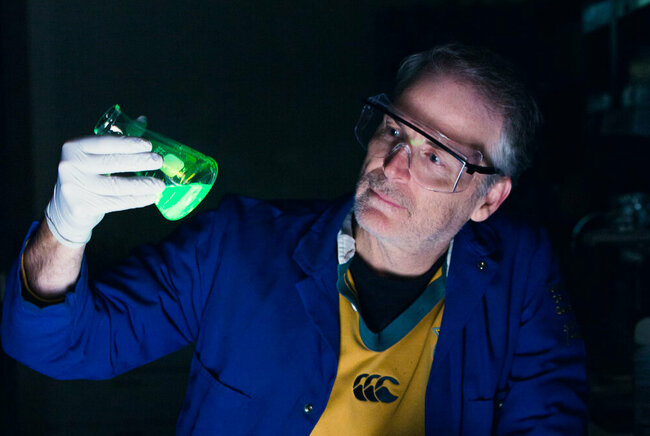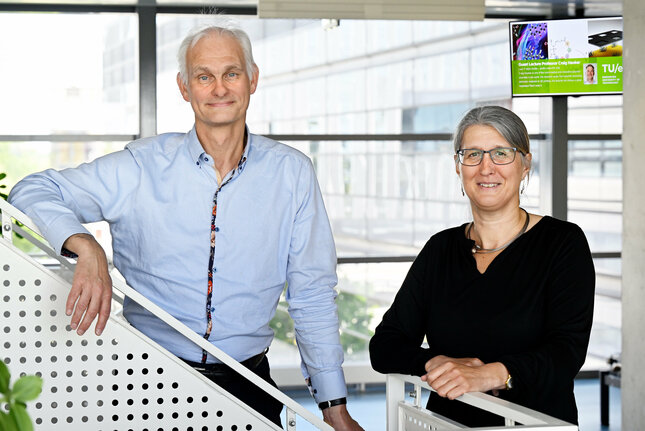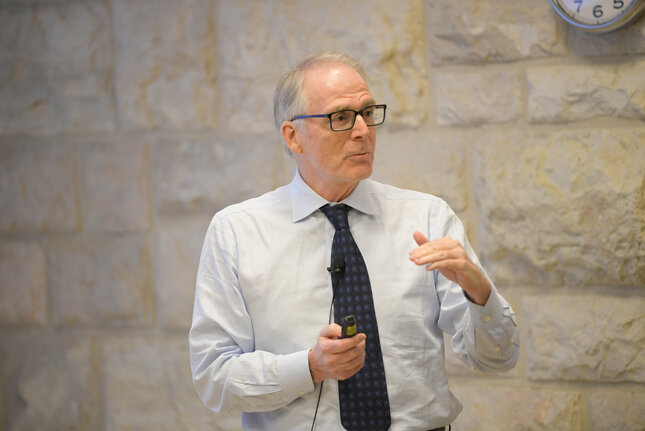TU/e Honorary Doctorate for polymer genius with a commercial spirit
Craig Hawker receives honorary doctorate during TU/e Research Day on Thursday, June 8.

One of the world's leading polymer chemists, Craig J. Hawker, professor at the University of California Santa Barbara, will be awarded the TU/e Honorary Doctorate during the TU/e Research Day on Thursday, June 8. Prior to the ceremonial festivities, we talk with Craig Hawker and his TU/e honorary supervisors Anja Palmans and Jan van Hest about his impact on polymer research and TU/e institute ICMS. About the power of applied research, how to make people 'less afraid of chemistry', and why that, in turn, can result in great commercial successes. And, surprisingly enough, there's a lot of talk about soccer.
His story is peppered with soccer comparisons and it soon becomes apparent why. Australian-born Craig Hawker was an avid Australian rules football player during his youth. For a long time, the talented Hawker aspired to a career as a professional player. But then he suffered a serious knee injury, shattering his boyhood dream.
“In hindsight, it may have been the best thing to happen to me,” Hawker chuckles. He decides to study chemistry - “an example of hands-on science” - at the University of Queensland and becomes fascinated by the pivotal role of chemistry.
He wanted to know more about reactions, the nature of materials, and the importance of a select number of building blocks. Via a PhD in Cambridge in the lab of Sir Alan Battersby, he arrived at Cornell University in the United States for a postdoc position with Jean Fréchet, and then spent ten years as a staff member at IBM Research.
Interface
Today, Hawker works at the interface between organic and polymer chemistry on macromolecular synthesis, polymer self-assembly, and 3D printing. He co-directs the California NanoSystems Institute, and holds the Alan and Ruth Heeger chair in Interdisciplinary Science at the University of California Santa Barbara.
He was recently described as “one of the top polymer chemists in the world”. The ethics of coaching and teamwork that he brought with him from the soccer pitch translate to a scientific environment “better than you would think”, says Hawker.

Guarantor of innovations
"With his innovative ideas he has changed the polymer world," says Jan van Hest, scientific director of TU/e's Institute of Complex Molecular Science (ICMS). Together with Anja Palmans, his ICMS colleague and professor of Supramolecular Chemistry & Catalysis, he nominated Craig Hawker for a TU/e honorary doctorate. Both he and Palmans will take on the role of honorary supervisor.
Hawker brings his research to the table in a unique way.
Honorary promotor Anja Palmans
"In one way or another, he has contributed to every major development in polymer research over the past decades. From block copolymer lithography to new methods of polymer synthesis, such as controlled radical polymerization. The latter involves forming a long polymer from highly reactive building blocks.
He is currently working with his colleagues on a revolutionary 3D printing technique that can produce objects with both rigid and flexible properties. With his inspiring conceptual thinking and his ability to bring different elements together to realize something he is guaranteed to develop innovations."
Exciting chemistry
"Everything he initiates expands," Palmans emphasizes. She points out another of Hawker's special talents. "Whereas most lectures in our field are, to put it mildly, not very exciting to listen to, Hawker brings his research to the table in a unique way. He knows how to make his work engaging. If polymers are made in ethanol, Hawker tests whether whiskey works as a substitute. It stamps the concept of radical polymerization into your memory."

You don't have to be afraid of chemistry. Basically, every chemical reaction is simple. - something complex can always be reduced to simple building blocks.
Honorary doctor Craig Hawker
Is this exemplary of his way of conveying knowledge? Hawker: "I always try to emphasize why chemistry is relevant. At the same time, I want people to understand that something that seems very complicated doesn't necessarily have to be. In essence, every chemical reaction is simple. There's no need to be afraid of chemistry, something complex can always be reduced to simple building blocks.
Mother as sounding board
My mother was always a good sounding board for me. As she had little formal education, copper-mediated alkyne–azide click chemistry was beyond her ken. But when I told her I was developing chemical compounds that work in all kinds of solvents, even whiskey, and that we were using it to create better drugs and new coatings, she understood the importance."
Research with a purpose
By demonstrating applications, you also make a chemical innovation more accessible to+ a wider audience, Hawker continues. "During my postdoc period, I learned that you can do fundamental research with a purpose: applied research. This view was life-changing for me as a researcher.
I didn't realize until later that my niche lay at the intersection of fundamental and applied research. You attract people who are interested in the fundamental part, but also bring people in at the boundaries who can use your chemistry in their own application."
Hawker is an exceptional researcher who knows how to successfully make commercial translations. That combination makes him of a special caliber.
Honorary promotor Jan van Hest
Hawker himself also likes to look for applications for the experimental work carried out in his lab. Applied research is difficult and anyone who manages to take concrete steps toward a product is to be commended, according to Van Hest. "Hawker has mentored dozens of startups and now has more than 80 patents to his name. He's an exceptional researcher and he knows how to commercialize knowledge. This combination of talents makes him very special."
Inventor of Olaplex
While he has developed drugs based on cross-linked polymers within successful companies such as Relypsa, Intermolecular and Tricida, the general public is probably most familiar with Hawker's foray into the hair care industry. He is one of the inventors of Olaplex, a hair treatment that repairs bonds in hair – a natural polymer.
Olaplex is now used by hairdressers worldwide to reduce hair damage caused by chemical and thermal treatments such as bleaching, coloring and styling; Hollywood stars call the hair products a technological breakthrough. Hawker remains level-headed about it. "By listening to experts in the field of hair care and looking at hair damage in a chemical way, we concluded that repairing bonds and limiting hair damage was an unexplored field, ripe for innovation."
That Olaplex became embroiled in a protracted battle with cosmetics giant L'Oreal over the latter's patent infringement after a failed takeover, Hawker attributes to "the costs of business." To which he adds that such a long court battle – which they won, by the way – also says something about the quality of the product they developed.
Teamwork
Back to research. When you are reaching beyond the boundaries of your research area, collaborations come naturally, Hawker explains. "You shouldn't underestimate the importance of teamwork. This is true not only on the soccer pitch, but also in academia."
"In my personal opinion, the research of the future is interdisciplinary, multidisciplinary and team-based. This is how you keep each other sharp and benefit from differences in perspective."
Collaborative research brings scientists together and makes research stronger; it's one of TU/e's strengths. Just like a top soccer player who wants to play for the best club, as a researcher you look for collaborations with ambitious world-class research groups. This is why we have been working with multiple TU/e researchers for years. Eindhoven’s polymer research is among the world's best."
Right momentum
Coinciding as it does with the celebration of the 15th anniversary of ICMS and the establishment of the new Interactive Polymer Materials (IPM) Research Center, made possible by the securing of a prestigious NWO Gravitation Grant, Palmans and Hest describe the awarding of this year's TU/e Honorary Doctorate to Hawker as "the right momentum."
Van Hest: " Hawker was recently appointed chair of the Scientific Board of IPM, another in the long list of his connections with TU/e. Similarly, we drew a great deal of inspiration for ICMS from Hawker’s work over in Santa Barbara. He is a continuous factor for our institute, both in evaluating new projects and in, for example, educating young researchers who have been going back and forth for years."
Students don't work for me, I feel that I work for them.
Honorary doctor Craig Hawker
As the interview comes to an end, Hawker has the final word. "All I'm trying to do is establish a creative environment for the students in my group. Students don't work for me, I feel that I work for them; I give support and try to provide them with the right infrastructure so they can focus on doing great research. I am happy to guide, to let them learn and grow."
"A supportive, personal note can make a difference. I try to be a coach, hopefully encouraging teamwork and teaching them not to be afraid of complicated or new things. Polymer science is a unique area if you want to do something of impact, and want to make a difference in the world by doing the research of the future. We face significant challenges, but have huge opportunities as well."
Media contact
Latest news



